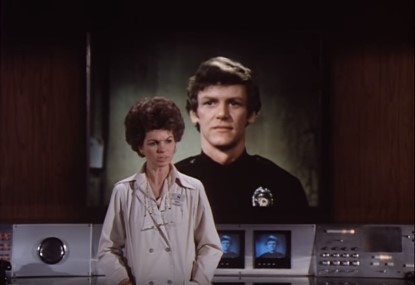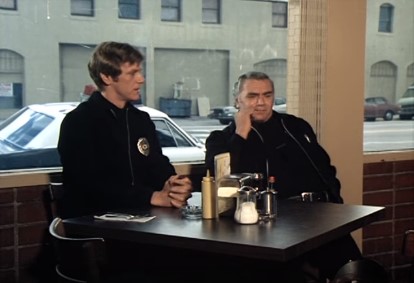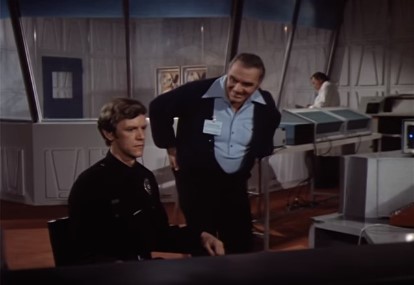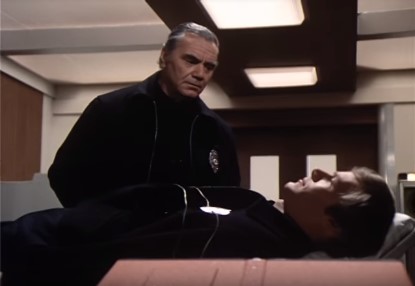Tune in Tonight: "Future Cop"
What do you do when you’re a TV network, and you produce a new show, and maybe you’re not too sure about how it’s going to go over with viewers? Well, you make another show almost exactly like it, just in case, as did ABC in 1976. Within just a few scant weeks of each other, it premiered both the previously reviewed Holmes & Yoyo, and Future Cop, which shared virtually the same plot, pairing a crusty, no nonsense cop with a new, younger partner who’s less than human. The primary difference is that Future Cop was twice as long and half as funny, and the titular character is so void of personality and charisma that he comes off as sinister.
The show opens with Haven, played by Michael Shannon (not that Michael Shannon, who would have been a baby at the time, but now I really want to see Michael Shannon play a robot cop) a robot prototype still in training as a police officer. Oh wait, no, I’m sorry, he’s not a robot, as one of his designers is careful to point out, he’s a “functioning biosynthetic android” (so, a robot), who’s programmed to quote Marxist theory in a vaguely British accent so he can overcome a group of hippies in a simulated hostage situation. Haven is higher tech than Yoyo, equipped with sensors that can detect traces of gunpowder on a suspect’s hands from across the room, and instantly identify a tire print on sight. He’s also incapable of instigating violence, with a “built-in failsafe” that prevents him from, say, deliberately banging a suspect’s head into a squad car door frame (or, if you want to go dark, choking a man to death for selling loose cigarettes).
What he doesn’t have a built-in fail safe for is hiding the fact that he’s a robot, as when he blurts out to a fellow cop that watching football isn’t part of his “programming.” Like Yoyo, he also takes everything people say to him literally, a gag TV writers of the 70s evidently found hilarious, but it’s pushing it a bit here, because you’d think a robot cop would be programmed to understand what “get down” and “cover me” means. What mostly gives away the fact that Haven is not like the other guys is his expressionless face, and unnervingly polite demeanor, which makes him seem more like a serial killer than a cop. A bone chilling scene in which a waitress attempts to flirt with him looks like something from an episode of Netflix’s Mindhunter, and the fact that the audience is supposed to be on this character’s side is baffling.
As in Holmes & Yoyo, for reasons that never go explained, it’s extremely important that the public, media, and other cops not know what Haven is. After the Mayor and Police Commissioner very reluctantly agree to give him a test run on the streets, he’s partnered with beat cop Cleaver (Ernest Borgnine, at least fifteen years too old to be playing a beat cop). Cleaver is lazy and rude, drinks on the job, and refuses to answer certain kinds of calls. Yet, he’s somehow also the best cop on the force, with multiple commendations and a partner (John Amos) who doesn’t like him, yet also turns down promotions out of loyalty.
Haven and Cleaver are together barely an hour before it become apparent that Haven is a different kind of cop. Like a vampire, Haven doesn’t eat or drink anything, and he accepts everything Cleaver says with blank faced acquiescence. That’s okay, though, Cleaver likes that, as opposed to his other partner, who has the audacity to try to speak to him. Things take a dark turn, however, when, while investigating an auto theft ring at a junkyard, Haven begins to malfunction in the presence of a car crusher. He demands of Cleaver, in an increasingly menacing tone of voice, “Do they do this to all machines? It isn’t right. They wouldn’t do this to you, would they? Would they? Would they?”
Just as it seems like Haven is about to throw Cleaver into the car crusher with all the other scrap metal, the car thieves show up. Haven pulls himself together long enough to help Cleaver capture some of the thieves, simply by keeping track of how many bullets they’ve fired out of their clips. However, like Yoyo, he’s injured on the job, revealing what he really is to Cleaver, who reacts with the same kind of shock and repulsion as Yoyo’s partner. Cleaver initially wants nothing to do with continuing to work with Haven, but has a change of heart after playing pinball, of all things. After working with him for a whole three hours or so, he’s grown to like this “clockwork joker,” as the Police Commissioner refers to Haven, and eventually agrees to continue mentoring him.
When they catch up to the remaining car thieves on the loose, Haven is injured again, this time more seriously than before. For some vaguely explained reason, the only way he can be salvaged is if his memory is completely wiped. In a scene that’s supposed to pack the same emotional punch as little Ricky Schroder sobbing over his father’s lifeless body in The Champ, Cleaver tearfully watches as Haven’s hard drive shuts down. He then demands that not only should Haven be restored to exactly as he was before, but that he should be partnered with Cleaver full time, even though, really, Haven is a terrible cop, who constantly puts himself into dangerous situations, and doesn’t understand what commands as simple as “get down” mean.
You’ll be relieved to know that, by the end of the episode, Haven has been programmed to be interested in football, thank God.
For a simple concept, Future Cop is one strange TV show. Besides the fact that one of its protagonists is creepy, and the other is just obnoxious, its primary issue is tone. Though Cleaver is supposed to be a lovable, wisecracking lug, Haven is almost a tragic figure, an outsider aware of his otherness who just wants to be accepted as normal. The father-son relationship he has with the German accented scientist who designed him also suggests a thoroughly unnecessary Frankenstein metaphor. In keeping with that, Haven always seems to be minutes away from malfunctioning in a way that ends up with someone getting their head ripped off, as opposed to Yoyo, who just does wacky things like get his hand stuck to a magnet.
It’s supposed to be touching that, in a matter of days, Cleaver has formed a bond with a machine that he couldn’t in over twenty years of working with his former partner, but the fact that his former partner is black makes that less heartwarming than questionable and uncomfortable. It’s also twice as long as Holmes & Yoyo, and, considering that the humor in it is so watered down as to be almost undetectable, it’s also twice as boring. A good half hour of the episode is devoted to Cleaver and Haven investigating an auto theft ring and sneaking around a junkyard, which is somehow even less interesting than it sounds. One wishes Haven would just ED-209 out and murder an innocent corporate drone, just so something happens.
In a bit of trivia far more interesting than anything that happens in this show, Harlan Ellison and Ben Bova sued ABC for plagiarism, after the network optioned the rights to a short story they wrote similar in plot to Future Cop, but didn’t start filming until after the rights expired (essentially preventing rival networks from jumping on it while it was in development, then cutting Ellison and Bova out of any residuals once it was made). Ellison and Bova won their lawsuit, receiving over $300,000 in damages, at the time the largest amount of money ever paid out in a plagiarism suit. Fair may be fair, but it probably gave Future Cop much more attention that it ever deserved.
Original airdate: May 1, 1976










